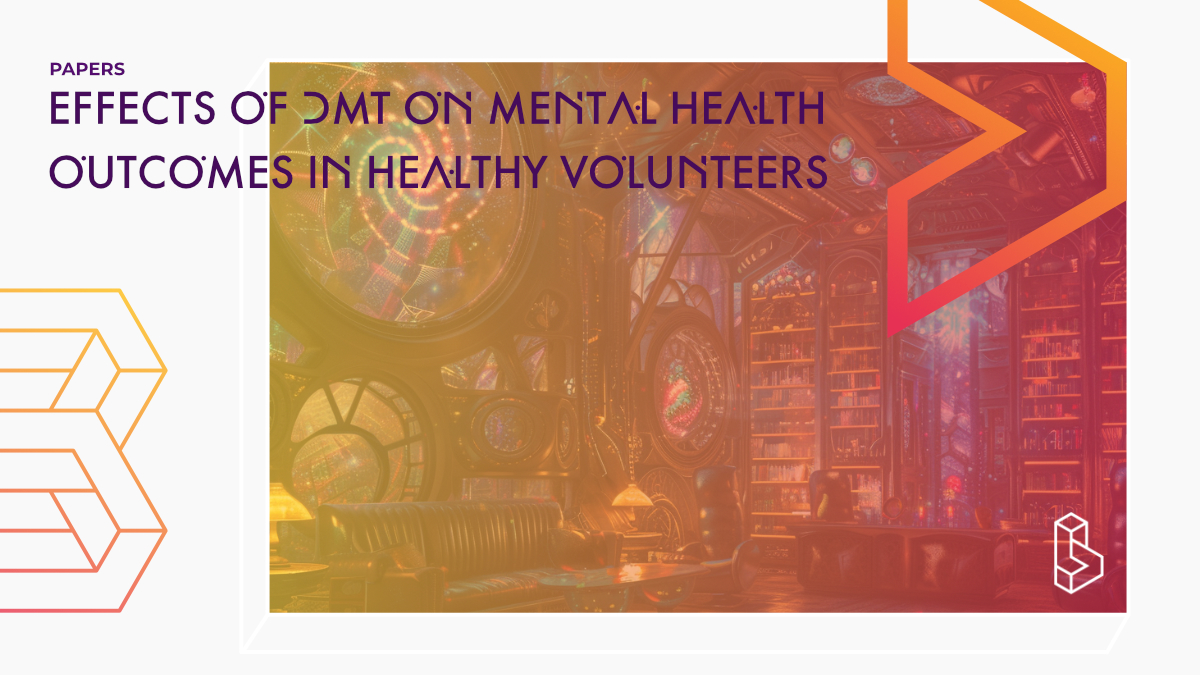This placebo-controlled trial (n=13) and prospective study (n=17) examine the effects of DMT (iv) on mental health outcomes in healthy volunteers. Significant improvements in depression scores are observed 1-2 weeks after DMT administration in both datasets, with reductions in trait Neuroticism found only in the placebo-controlled sample. Correlations between acute peak experiences and changes in depression and trait anxiety are noted.
Abstract of Effects of DMT on mental health outcomes in healthy volunteers
“Psilocybin, a serotonergic psychedelic, is being increasingly researched in clinical studies for the treatment of psychiatric disorders. The relatively lengthy duration of oral psilocybin’s acute effects (4–6 h) may have pragmatic and cost-effectiveness limitations. Here, we explored the effects of intravenous (IV) N,N-Dimethyltryptamine (DMT), a closely related, but faster-acting psychedelic intervention, on mental health outcomes in healthy volunteers. Data is reported from two separate analyses: (1) A comparison of mental health-related variables 1 week after 7, 14, 18, and 20 mg of IV DMT versus IV saline placebo (n = 13) and, (2) A prospective dataset assessing effects before versus 2 weeks after 20 mg of IV DMT (n = 17). Mental health outcomes included measures of depression severity (QIDS-SR16), trait anxiety (STAI-T), Neuroticism (NEO-FFI), wellbeing (WHO-5), meaning in life (MLQ), optimism (LOT-R), and gratitude (GQ-6). In both the prospective and placebo-controlled datasets, significant improvements in scores of depression were found 1–2 weeks after DMT administration. Significant reductions in trait Neuroticism were only found for the placebo-controlled sample. Finally, changes in depression and trait anxiety correlated with acute peak experiences (assessed via ‘Oceanic Boundlessness’). While the use of two separate cohorts in pooled analysis limits the generalizability of these correlational findings, these results suggest that DMT may reduce depressive symptomatology by inducing peak experiences. The short half-life of IV DMT and its potential for flexible dosing via controlled infusions makes it an appealing candidate for psychedelic medicine. Further research in clinical samples is needed to corroborate the therapeutic potential of DMT.”
Authors: Christopher Timmermann, Richard J. Zeifman, David Erritzoe, David J. Nutt & Robin L. Carhart-Harris
Summary of Effects of DMT on mental health outcomes in healthy volunteers
Mental illness is a major global public health problem, and psychedelic therapy has been found to improve a range of mental health outcomes.
Research on the therapeutic utility of classic psychedelics has focused on psilocybin, LSD, and ayahuasca. These studies have found that these drugs can reduce symptoms of depression and anxiety, and improve psychological well-being, optimism, mindfulness capacities, and meaning in life. Studies of DMT monotherapy have been limited by small sample sizes and drug confounds. However, some studies have found significant decreases in depression 1 day after DMT administration.
DMT has a distinct profile from other classic psychedelics, including vivid visual imagery, intense proprioceptive or somatosensory effects, and near-death-like experiences. Its short acute duration and apparent lack of tachyphylaxis allow for flexibly adapting its administration to variable durations.
Find this paper
Effects of DMT on mental health outcomes in healthy volunteers
https://doi.org/10.1038/s41598-024-53363-y
Open Access | Google Scholar | Backup | 🕊
Cite this paper (APA)
Timmermann, C., Zeifman, R.J., Erritzoe, D., et al. (2024). Effects of DMT on mental health outcomes in healthy volunteers. Scientific Reports, 14, 3097.
Study details
Topics studied
Healthy Subjects
Anxiety
Depression
Personality
Study characteristics
Original
Placebo-Controlled
Double-Blind
Single-Blind
Observational
Within-Subject
Randomized
Participants
30
Humans
Institutes
Institutes associated with this publication
Imperial College LondonThe Centre for Psychedelic Research studies the action (in the brain) and clinical use of psychedelics, with a focus on depression.
Compound Details
The psychedelics given at which dose and how many times
DMT 5 - 20μg | 1x

